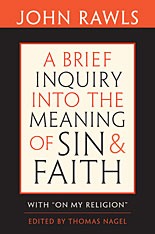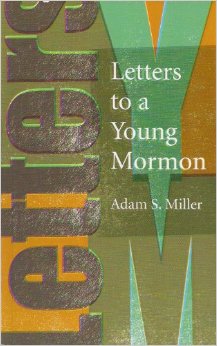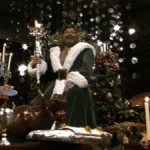Rawls wrote in "On My Religion" that one of the texts on religions which has most struck him is the Colloquium of the Seven by Jean Bodin. Rawls noted that three features of Bodin’s thought stood out and impressed him about Bodin:
First, Bodin was committed to toleration as a life-long Catholic. Rawls differentiates this from Spinoza who "came to toleration after rejecting or changing his religious faith" (Rawls 2010, 266). Toleration was instead for Bodin "an aspect and consequence of the harmony of nature as expressed in God’s creation" (266).
Second, Bodin thought it "was wrong to attack a person’s religion, especially if one did not try at the same

time to present a better one to put in it place" (266). Rawls notes that the seven speakers in Bodin’s Colloquium end by agreeing to "abandon their attempts to refute one another’s religious opinion" and instead to "describe their religious views so that all may learn what others think and be able to understand what their belief are in their best light." (266) For Rawls, this means that "friendly and sympathetic discussion of our beliefs is accepted as an important part of our religious life, argument and controversy are not." (266)
Third, Rawls interprets Bodin as recognizing "some bounds on what religions are admissible." While these bounds are not completely clear, according to Rawls, one is "affirming as part of religious doctrine and distinct from political ideas." (266-267)
This view of religion, one which seems quite favorable to me, shows why Rawls is so optimistic about the possibility of political liberalism. He appears inclined to view religion as reasonable and is very hopeful that religions (and the religious) are capable of viewing other religions as reasonable.
I think that Rawls’ positive view of religion, though from a somewhat secular perspective, permeates his later work on political liberalism. This, in many ways, distinguishes Rawls from other liberal and secular thinkers who are more suspicious and skeptical of religion. Now, Rawls clearly thinks that there
are unreasonable religious and philosophical outlooks. However, he says that "a person’s religion is often no better or worse than they are as persons, and the idea of the reasonable, or some analogous idea, must always be presupposed." (267)
Often, it seems that Rawls is interpreted as demanding that religious views (he calls them comprehensive doctrines) must prove themselves to be reasonable. To me, this has often seemed to assume a more pessimistic view of religion on the part of Rawls. Instead, if we are going to presuppose that religious views are reasonable, we are giving religion and religious views the benefit of the doubt. By saying that there are both reasonable and unreasonable religious views, we might jump to the conclusion that Rawls views religions as somehow being inherently unreasonable. I actually do not think that Rawls treated religion as being anymore likely to be unreasonable than secular world views.
The cultural "us vs. them" battle between religion and secularism might taint how we view such treatments of religion, particularly by a secular liberal thinker like Rawls. However, to do so is a mischaracterization of both Rawls and political liberalism.
Next up: Rawls on Bodin and Atheism.
Follow this link to see the posts in this series on Rawls and religion.
Follow this link for Approaching Justice posts about John Rawls.











